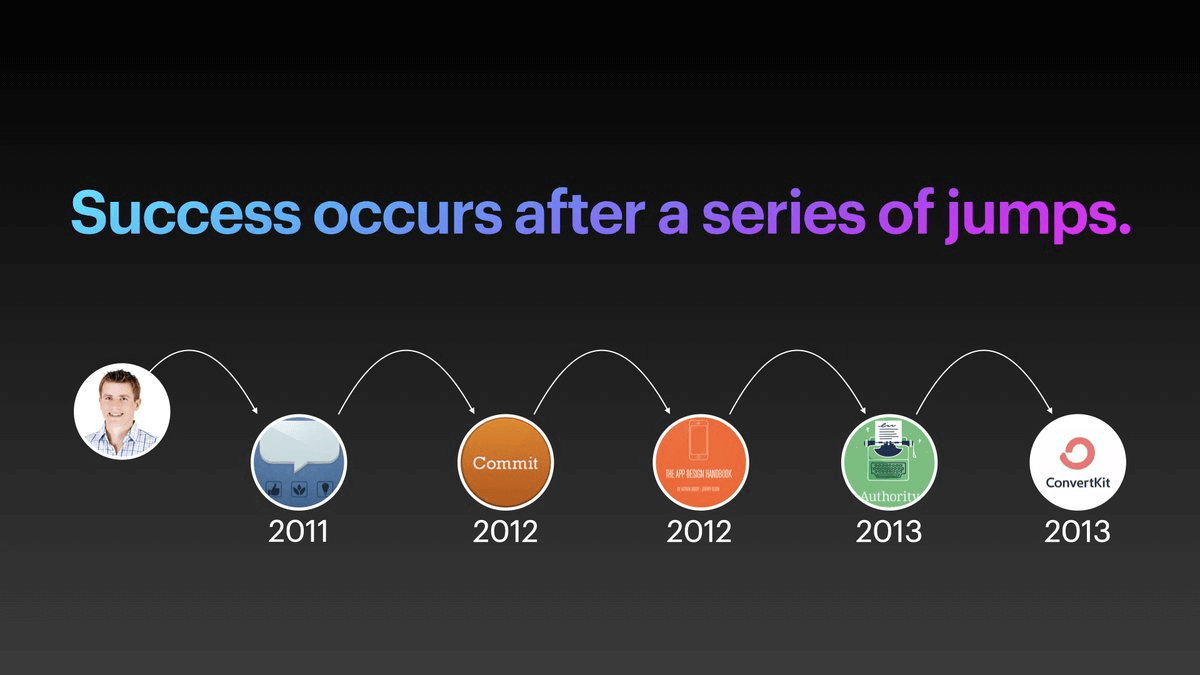Compounding returns
My friend Nathan Barry is one of the youngest successful entrepreneurs I know: he founded ConvertKit, which now has $40 million in annual revenue. Recently, they were valued at $200 million. Nathan is turning 34 this year.
I'm convinced that Nathan's early success with ConvertKit stems from his practice of consistently launching projects from age 17 to 23.
Nathan started as a freelance web designer at 17. By 21, he was releasing apps on the App Store (making $2k / month). At age 22, he wrote his first design book, which earned him $26,679 in 24 hours.
He didn’t stop there; he kept iterating and gaining leverage in multiple areas (building an audience, forming connections with key people, gaining skills and resources).
By the time he turned 23 and founded ConvertKit, he had amassed an extensive portfolio of business projects.
For Nathan, each project he launched was an iteration on his path to achieving success with ConvertKit.
Success almost always occurs after a series of jumps.
Accumulated experience is the foundation of success
Your ability to launch a successful business depends on the accumulation of experiences, connections, skills, resources, experiments you've run, and insights you've gathered.
Today, ConvertKit's mission is to "help creators earn a living online." Nathan and his team design and build the product with intuitions about what creators want and need. How did they develop those intuitions? Nathan developed his intuitions through his time being a creator. His experience writing and launching multiple apps, books, and courses from 2011-2013 informs his work today.
As an indie entrepreneur, you want to maximize every advantage you have. Most good markets are competitive, so you can't just show up with a "good product;" you need an edge. Your competitive advantage should be that you understand the customer (and what they want) better than anyone else.
Can you still iterate to a successful business if you're older?
A Harvard Business study found that "the average age of a successful startup founder is 45." This is roughly true for me now: Transistor (the startup I founded with Jon Buda) is doing well, and I'm turning 44 this year.
However, success doesn’t operate on a clock—you can’t simply hit 45 and expect to launch a thriving startup. The groundwork for success all happens well in advance.
The age you are when you start a business is less important than the number of iterations you have amassed along your journey.
Your goal (at any age) should be to weave interesting threads into your life continuously, forging meaningful connections and launching your projects.
How did this work in my life?
On Twitter, someone asked: "How did you do [all this] with Transistor?"
I was 38 when I co-founded Transistor. Before that, I had spent six years:
Starting podcasts (Product People, Build & Launch, Megamaker)
Being a guest on 20+ podcasts
Participating in podcast forums (Hotpod, G+ hangouts, Reddit)
Going to events where podcasters gathered (XOXO, MicroConf, New Media Expo)
Building relationships with podcasters, joining multiple Slack groups
Reading podcast newsletters, editorials, trend reports
Launching a few products that appealed to podcasters (two books and a course)
Wrote multiple blog posts about podcasting that did well
At MicroConf in 2018, I spoke about how all these iterations led to Transistor.
This talk was given before we had officially launched! (At the time, we had 39 paying early-access users.)
In retrospect, my intuitions at that time turned out to be prescient: I had watched the podcasting market for a long time, and 2018 ended up being the perfect time to enter the industry. In terms of podcast hosting, people were ready for something fresh.
Success isn't guaranteed, regardless of age, but if there’s a path to it, it’s through continuous iteration.
Cheers,
Justin Jackson
Connect with me on:
💼 LinkedIn
🐘 Mastodon
🧵 Threads
🐦 Twitter.
